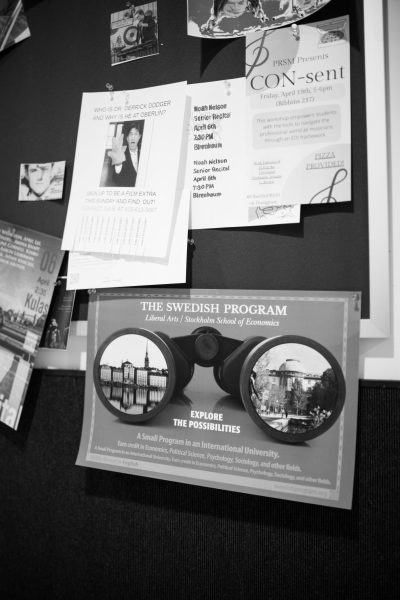Oberlin Dining Forum Highlights Issues With Sensationalist Activism
Oberlin students identify as activists. That activism must reach beyond a Google Doc.
In the wake of the implementation of the 300 meal-per-semester plan for first-years and sophomores, Dascomb Dining Hall’s closure, and this year’s changes to DeCafé, Campus Dining Services has become one of the first major flashpoints for the anxieties and fears of the student body as our school changes. In the past few weeks, outraged Facebook posts and Google Doc activists have brought dining changes to the forefront of campus chatter. With that in mind, I find myself coming away from the recent forum on the state of campus dining with a lot of mixed feelings about student activism as I’ve seen it on this campus.
The anger and anxiety around the dining changes from many students is understandable, and often justified. As social media posts explode, students want to feel as though they are making a difference, which leads to angry emails and Google Doc activism. This in itself is not a problem.
The problems arise when our activism stops there. The problems arise when over 700 people write their names at the bottom of a Google form, but barely 40 show up for an event with decision makers who are open to discussing their concerns.
When students stop their engagement with an issue at the digital level, the potential for impact decreases and they do a disservice to those who actually want to make change happen. Without taking the time to fully grasp issues and understand the rationale behind unpopular policy changes, and without a nuanced understanding of difficult decisions, students are guaranteeing the ineffectiveness of their own movement.
Beyond the issue of half-heartedly engaging in tangential activism (which, frankly, is tired, widespread, and more irritating than thought-provoking), the dining forum highlighted some other interesting challenges. Confronted with the financial reality behind the dining changes, especially the decision to stop allowing meal swipes for groceries at Decafé, it is easy to be daunted.
At the forum, Vice President and Dean of Students Meredith Raimondo dove deeply into the retail economics that led to this decision, and it is genuinely complicated. It’s convoluted, and it has to do with economic factors that are difficult to express to students who aren’t directly invested in those fields (my Russian Language and Literature major certainly doesn’t make it any easier for me to understand supply chains and economies of scale and all that jargon). The information is opaque and mathy, and it doesn’t lend itself to the type of loud, bold, fast activism that many on this campus practice.
Watching Dean Raimondo quickly lose the crowd as she got into the specifics on this issue highlighted her inability to present the information in concise terms. It also emphasized the amount of work it will take on the part of students to be well-versed enough in the nuances of our dining challenges to be able to work towards a solution. We are too quick to claim that the changes make no sense when we really don’t understand — or even try to understand — the scope of the issue. We are also too quick to write off any technical explanation as non-transparent.
Throughout the forum, money loomed as an overarching issue. People were angry that options were reduced while prices were not, and because they felt as though they were not getting the quality of food they paid for. People felt that they were paying a ridiculously high cost for dining.
These concerns pose a huge issue for people on all sides. On one hand, students are put in a financial bind (or quite literally driven out) by the price of dining at Oberlin. The prices are very high and could threaten people’s ability to stay at Oberlin. On the other hand, focusing only on the negative aspects of Oberlin’s dining costs skirts around the fact that the meal plans are so expensive here largely because of the cost of labor.
I believe most Oberlin students would agree with me when I say that unionized labor is valuable and that Oberlin is better as an institution for working with the union. Unionized workers get paid competitive wages with benefits. The cost of labor is factored into our meal plans. The cost of dining is, in large part, the cost of our values. We have to understand that. We cannot expect to pay the same amount of money for food made by workers making minimum wage as we pay for food made by union workers making over three times that much.
Wednesday’s forum needs to be the beginning of widespread student engagement in working toward actively improving campus dining. It also needs to be the beginning of a long-needed re-evaluation of the sensationalist chatter on campus that so often passes for activism.


